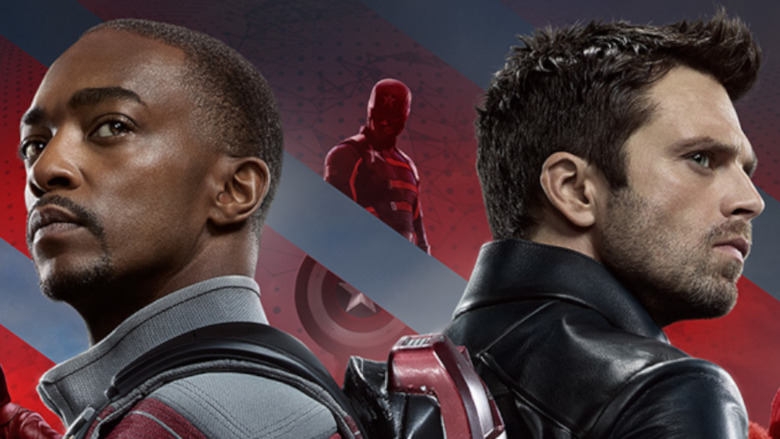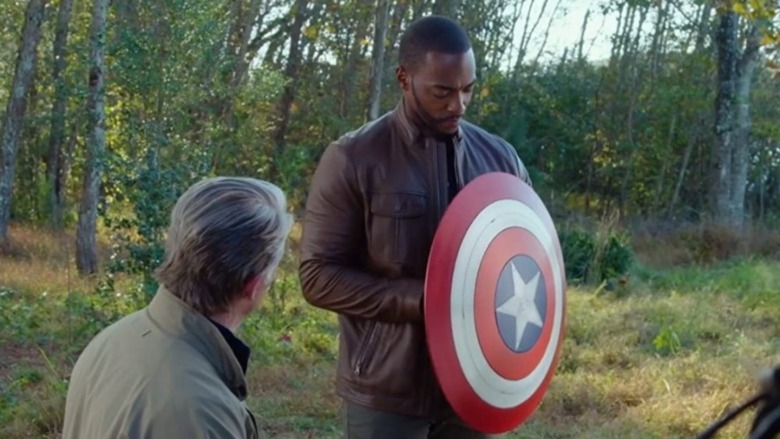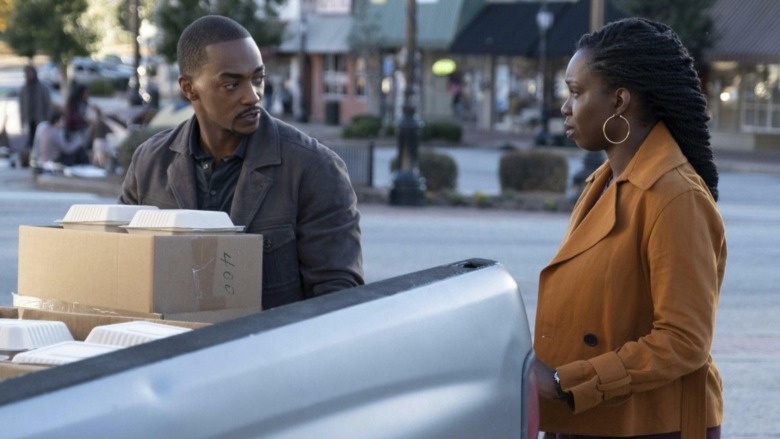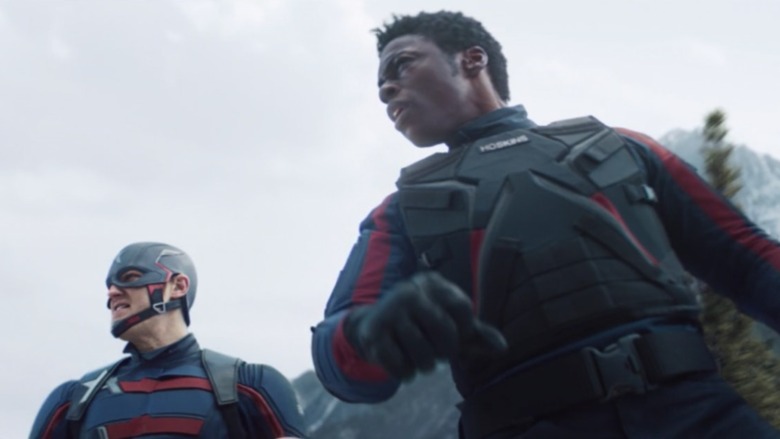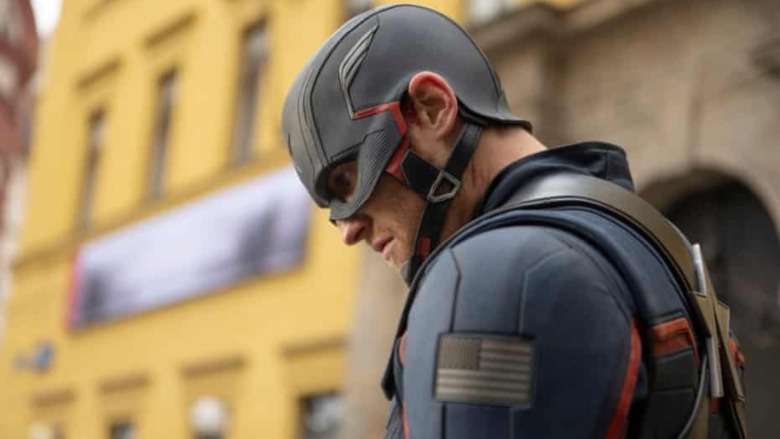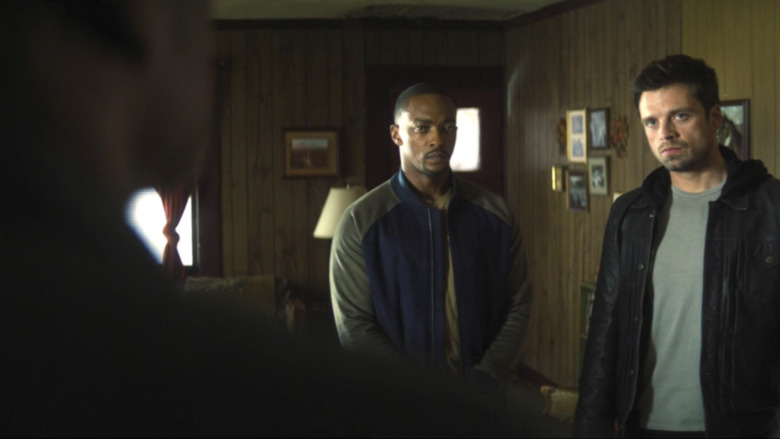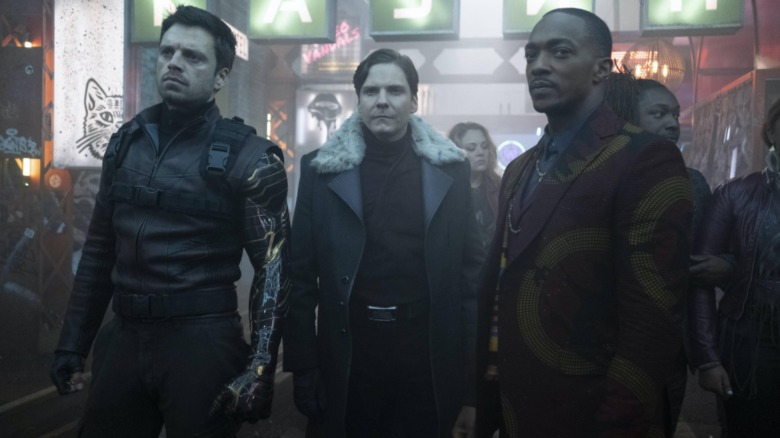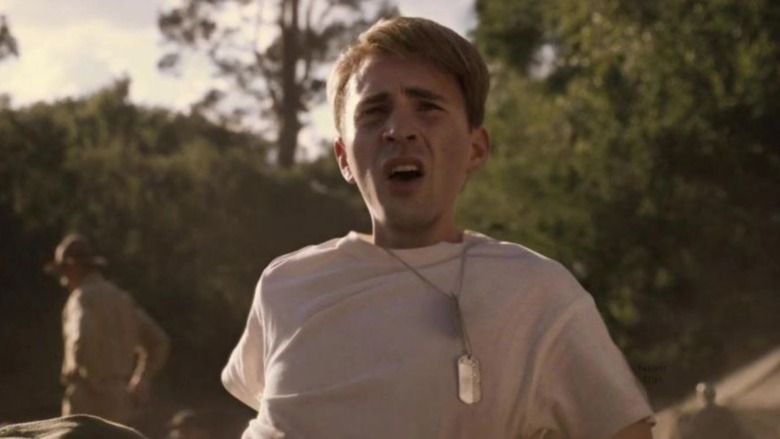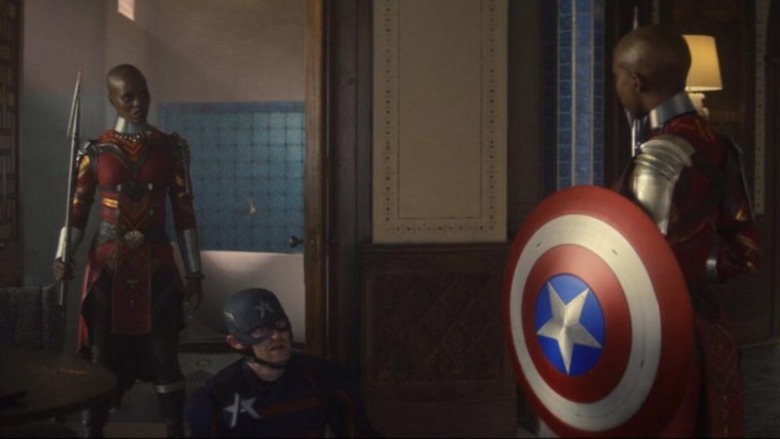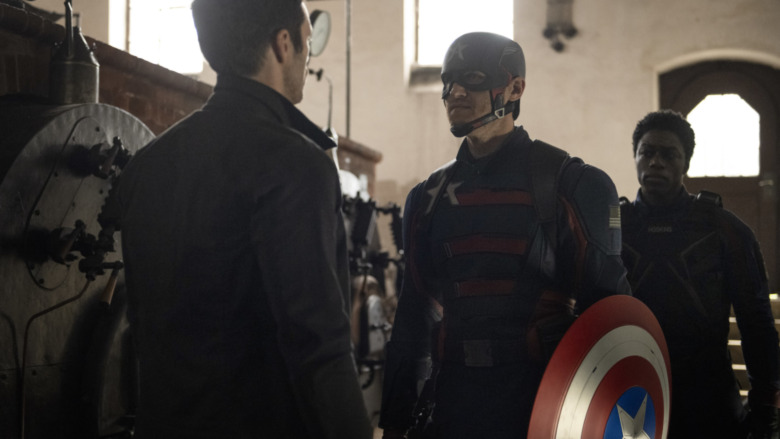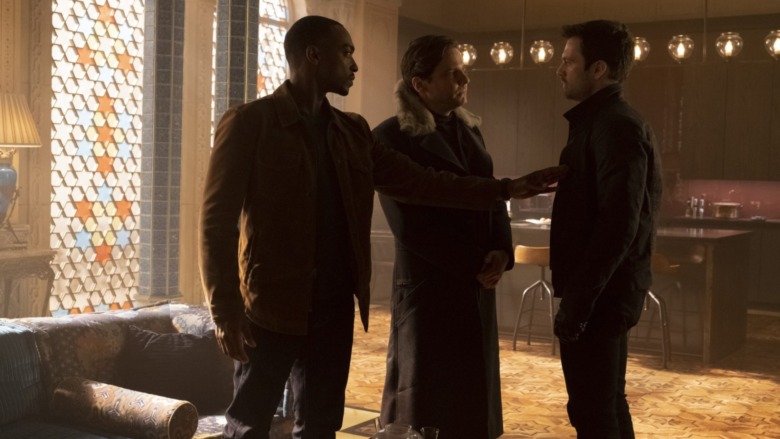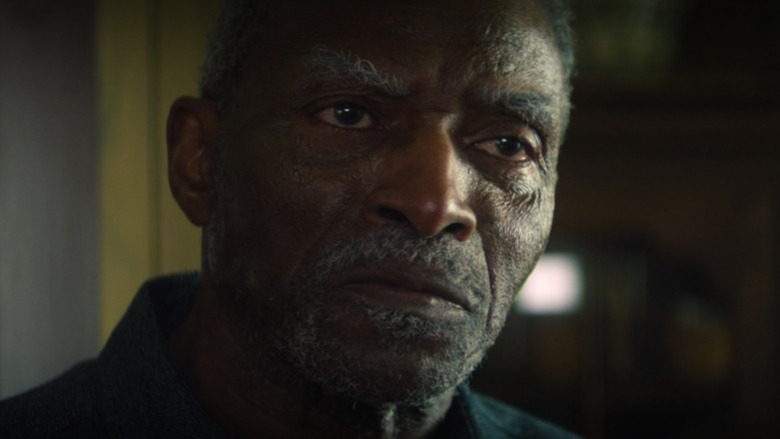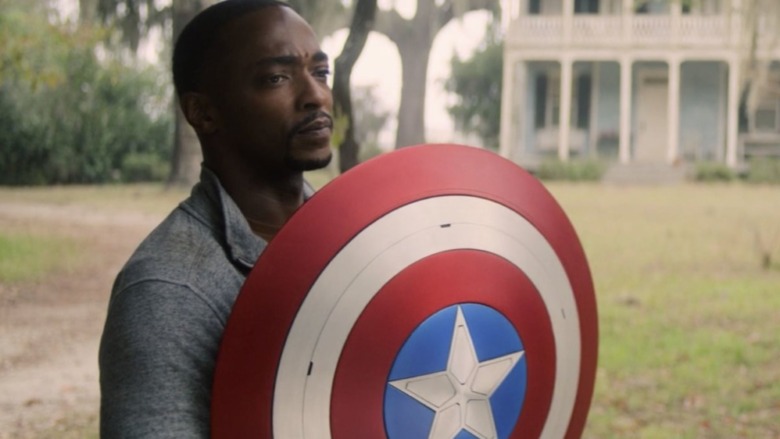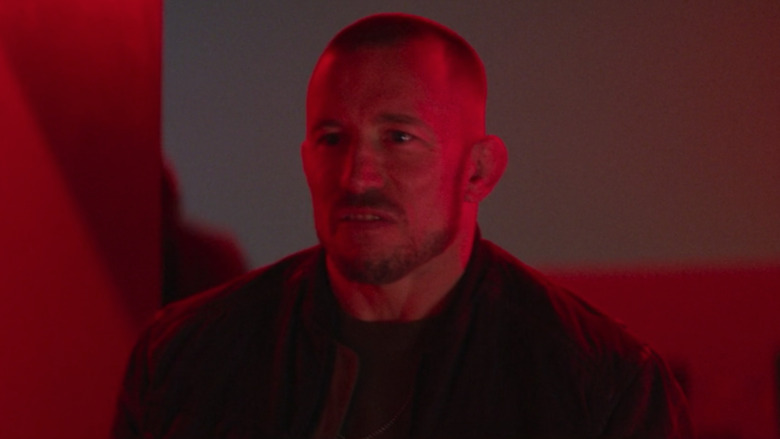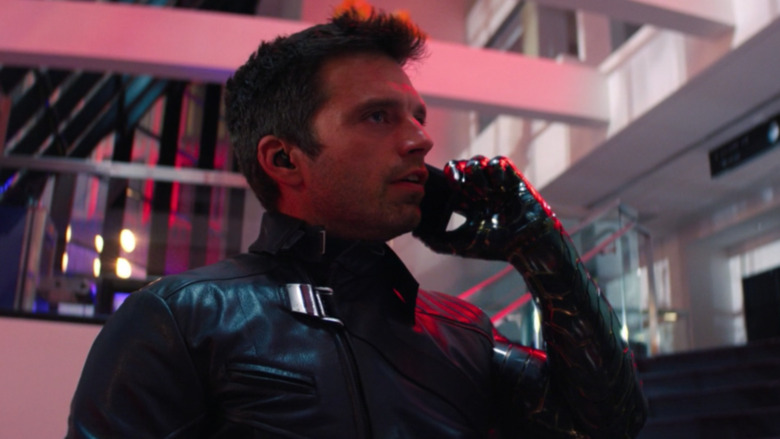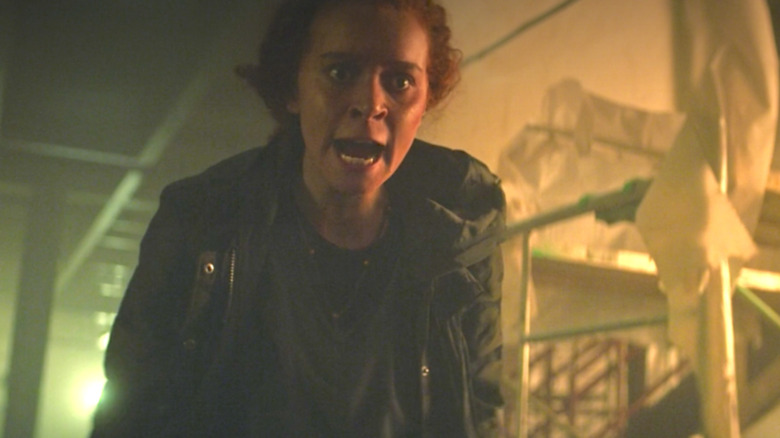Lines In The Falcon And The Winter Soldier That Are More Important Than You Realized
Avengers: Endgame, the epic conclusion to the Infinity Saga released in 2019, ends with Steve Rogers (Chris Evans) passing the torch to his best friend Sam Wilson (Anthony Mackie), a.k.a. Falcon, following the final fight against Thanos (Josh Brolin) and his army. After disappearing into the past to return the Infinity Stones and Mjolnir to their correct places in history, an elderly Steve reappears at the Avengers compound and gives his famous vibranium shield to Sam. Shocked, Sam begrudgingly accepts the shield from Steve, remarking that it "feels like it's someone else's." Steve is resolute in his decision, warmly telling his friend "it isn't."
The Falcon and the Winter Soldier explores the aftermath of Steve's decision and what it means to be Captain America. Sam struggles to accept the mantle and its meaning. As the series progresses, it becomes a detailed exploration of race, identity, and the effects of the super soldier serum, as Bucky Barnes (Sebastian Stan), John Walker (Wyatt Russell), and Sam clash over the shield — and who the right man to carry it truly is. With the world moving on from the Blip, and the Marvel Cinematic Universe paving the way for the future with Disney+ shows like Falcon and the Winter Soldier and WandaVision, new characters are stepping forward to shed light on their situation with poignant and impactful statements. Here's a look at some lines heard throughout the series that have more meaning than you might have realized.
Symbols are nothing without the women and men who give them meaning
One of the central themes explored throughout The Falcon and the Winter Soldier revolves around Captain America's shield, and what it symbolizes to the rest of the world. To Bucky Barnes, the shield represents family. It is his last remaining link to Steve Rogers and the world he knew in the 1940s before Hydra turned him into the Winter Soldier. To John Walker, the shield represents the high expectations he has to live up to as the new Captain America and a symbol of hope for his country. To Karli Morgenthau (Erin Kellyman), the shield is a symbol of a "bygone era" and a monument to the people whose stories were erased from history — like Isaiah Bradley, the Black soldier Bucky reveals to Sam as a fellow recipient of the serum.
Cap's shield means different things to different people, but arguably only Sam views it for what it really is: just a symbol, and as he tells the attendees at the Smithsonian ceremony when he turns the shield over to the government, "Symbols are nothing without the women and men who give them meaning." Steve's legacy defines the shield until it falls into John Walker's hands. When the new Captain America uses it to murder one of the Flag Smashers after Karli kills Lamar Hoskins, the image of the bloodied shield represents a rapid fall from grace because of the man who wields it. Sam finally reclaiming the shield indicates redemption for its damaged reputation, as he redefines what it means to be Captain America.
To the rescue, huh?
To the majority of the world, Sam Wilson is a hero. He is the Falcon, a member of the Avengers who faced Thanos the Mad Titan and his army in Infinity War and Endgame. It could be argued that this heroism is part of Sam's nature. He is a rescuer, swooping in to save the day. Sam's first scene in The Falcon and the Winter Soldier features him rescuing someone from Winter Soldier villain Georges Batroc, a.k.a. Batroc the Leaper. Sam's sister Sarah (Adepero Oduye) comments on her brother's heroic character in the same episode, good-naturedly quipping "To the rescue, huh?" when he vows to help save their family's boat and ease their financial struggles with the bank.
When fans first meet Sam in Captain America: The Winter Soldier, he explains that, prior to aiding Steve in the fight against Hydra, he worked as a pararescueman for the United States Air Force. This establishes Falcon as someone who dedicates his life to rescuing other people. Later, during a conversation with his sister in episode five's "Truth," Sam talks about wanting to make a positive difference in the world, regardless of the boundaries and expectations placed on his shoulders by society. This earlier fond moment between the Wilson siblings shows just how much Sarah understands her brother, and why Sam is the perfect person to pick up the mantle of Captain America. Like Steve Rogers before him, Sam is a hero, always ready to fly to the rescue and stand up to bullies.
You can't just punch your way out of things anymore
If it sounds familiar when Lamar (Clé Bennett) tells John Walker "You can't just punch your way out of things anymore" during episode two, "The Star-Spangled Man," there's good reason for that: It's a callback to Captain America: Civil War, when Natasha Romanoff asks Steve Rogers "Do you really wanna punch your way out of this?" as the Avengers prepare to battle. Indeed, both versions of Captain America could have done with talking things through instead of rushing in with fists. In "The Star-Spangled Man," fans get to meet John Walker properly for the first time as he accepts the mantle of Captain America and gets some much-needed advice from his best friend.
Lamar's warning foreshadows Walker's descent throughout the series, including Walker murdering one of Karli's allies in public during "The Whole World Is Watching." This is the moment that separates Walker from Steve Rogers and establishes that he isn't worthy of being Captain America. When Bucky falls from the train to his supposed death in Captain America: The First Avenger, Steve doesn't beat Zola to death with the shield. He apprehends him instead, showing his ability to react with a clear head despite his emotions. Now that he has the super soldier serum in his veins, Walker's violent path is far from over. He believes he is Captain America, and isn't letting go of the mantle without a fight.
That serum doesn't have a great track record
John Walker's right when it comes to one thing; the super soldier serum doesn't have a great track record. Most people injected with variants of the serum suffered side effects, becoming unstable or even dying. The serum itself was used by Hydra, who gave it to Bucky and several other Winter Soldier candidates. The other soldiers, featured in Civil War, are revealed to have been too unstable for Hydra to control, and were frozen in cryostasis until Zemo killed them. With the exception of Steve Rogers and Isaiah Bradley, the serum seems to have had negative effects on most of the super soldiers, from the Red Skull to Karli Morgenthau and John Walker.
Walker's line shows that, despite his hot-headedness, he understands what a risk the serum poses. This doesn't stop him from taking it, however, highlighting how powerless he feels without the enhanced super-strength Steve Rogers had. Walker doesn't seem to fully realize, however, that Steve was more than a strong soldier. Both of them were chosen to be Captain America for different reasons: Erskine picked Steve for his good heart, whereas the government selected Walker because he showed valor on the battlefield.
You think you can wake up one day and decide who you wanna be?
Another theme that Falcon and the Winter Soldier explores is identity. The show begins with Sam rejecting the identity of Captain America, and Bucky struggling to find peace after breaking free from his Winter Soldier programming and finally becoming himself again. During "The Star-Spangled Man," the duo travel to Baltimore to meet someone whose identity was functionally erased: Isaiah Bradley, the first Black super soldier. Bucky reveals that he clashed with Isaiah as the Winter Soldier in Goyang during the Korean War, resulting in Isaiah ripping Bucky's metal arm from his body.
Isaiah's story, though similar to that of Steve Rogers, was wiped out by the government, and he spent 30 years in prison while Steve was celebrated as an icon. When he asks Sam "You think you can wake up one day and decide who you want to be?," it represents how little choice he had in deciding his identity. He was tricked into taking the super soldier serum, used as a means to an end, then discarded and deleted from the public record. This line resonates with Sam as he comes to terms with what it means to decide who he wants to be — and whether it means accepting the identity of Captain America.
Didn't take much for him to fall back into form
Bucky Barnes spent more of his life as the Winter Soldier than he did as himself. In 1943, he enlisted in the army and was assigned to the 107th, before he and his soldiers were captured by Hydra and experimented on by Zola. Steve Rogers rescues his best friend during Captain America: The First Avenger and the duo go on to fight against Hydra with the Howling Commandos. Unfortunately for Bucky, an ambush on a train goes awry and he falls into the clutches of Hydra once more.
Bucky spends over 50 years as the Winter Soldier, programmed to kill with his memory wiped between bouts of cryostasis, until he meets Steve again in 2014 during Captain America: The Winter Soldier. Bucky tries to shed the Winter Soldier's identity but it continues to haunt him, and it isn't until his exile in Wakanda that the programming is finally lifted from his mind. Even then, the Winter Soldier is a familiar role to play. Zemo remarks that it "didn't take much for him to fall back into form" when Bucky pretends to be his former self in Madripoor, preying on Bucky's insecurities about whether he's changed after all.
There has never been another Steve Rogers, has there?
What made Steve the perfect candidate for the super soldier serum? He says it best himself during Captain America: The First Avenger: "I don't like bullies." Steve knows what it means to be the little guy — literally. Before he could jump out of planes and defy physics with his shield, Steve was small and sickly, rejected by the Army several times because of his health. He doesn't let that stop him, and goes on to become one of Earth's mightiest heroes and an undeniable force for good.
Steve's history as the "little guy" makes him more empathetic, and is something other super soldiers haven't experienced. The Red Skull and the other Winter Soldiers shown in Captain America: Civil War are corrupted by the serum, likely because they were corrupted to begin with. John Walker's flaws are magnified by the serum, and even Bucky is brainwashed and forced to become a killer by Hydra. Zemo is aware of the serum's track record when he makes this oddly respectful comment about Steve, and at the same time unknowingly references the original Cap's similarities with Sam. Sam is another empathetic character in the MCU: he leads counseling sessions in Captain America: The Winter Soldier, understands Karli's perspective and tries to reach out to her, and even helps Bucky find some resolution. There isn't another Steve Rogers to pick up the shield — but there is Sam Wilson, and Steve clearly understood that.
They weren't even super soldiers
John Walker's defeat at the hands of the Dora Milaje proves to be the final straw that pushes him towards the super soldier serum in episode four's "The Whole World Is Watching." Throughout The Falcon and the Winter Soldier, Walker struggles to live up to the legacy of his predecessor. Many characters, including Sam, Bucky, and Zemo, acknowledge that Steve was a rare man, unaffected by the serum's negative side effects. Steve's shoes are hard to fill, even for a veteran as decorated as Walker.
Walker struggles to go toe-to-toe against Karli and the Flag Smashers, but it's his loss to the Dora Milaje that humiliates him and drives him to take action after he dejectedly notes that "they weren't even super soldiers." Even without superpowers, the Dora Milaje defeat John in a fight; their combat training and vibranium weaponry are unparalleled. This loss fuels Walker's decision to take the serum so he can feel less inadequate, but what Walker fails to understand is that Steve was more than just his superpowers. He was a good man, handpicked by Dr. Erskine due to the value of his character, not his abilities as a soldier. Instead of trying to condescend and overpower the Dora Milaje, Steve would have approached them with more respect and diplomacy. This relates to Lamar's earlier line about Walker trying to "punch [his] way" out of situations, a near-impossible feat when faced with the warrior women of Wakanda.
Barnes, your partner needs backup in there
Although Sam and Bucky struggle to get along initially, their relationship evolves throughout The Falcon and the Winter Soldier as they begin to open up to each other and understand the other's point of view. Despite the banter, there's no doubt that, by the time they confront Karli at Mama Donya's funeral, they are partners, just as they were with Steve Rogers. John Walker unknowingly marks an important milestone when he goads, Bucky by saying "Barnes, your partner needs backup in there," with Bucky forced to confront the uncomfortable reality that he cares about Sam.
Sam can handle himself, but the threat of a super soldier like Karli isn't to be taken lightly. Walker plays on Sam's vulnerability as well as Bucky's guilt, as the former Winter Soldier couldn't live with himself if Sam's death was added to his conscience. It's also important to note that this is the first time Walker addresses as "Barnes" rather than using his nickname. Walker is no longer trying to sway Steve's best friend into fighting with him, adding authenticity to his role as Captain America. Instead, he makes it clear that Bucky's feelings of distrust are reciprocated in an effort to manipulate Bucky into allowing him and Lamar to ambush Karli.
Blood isn't always the solution
If any line in the series proves why Sam Wilson should be Captain America, it's his remark to Zemo following his confrontation with Karli in "The Whole World Is Watching." It could be argued that Zemo's intentions aren't necessarily evil, though he possesses a ruthless streak that makes him a dangerous person. Like Thanos, Zemo doesn't shy away from murder in his attempts to serve what he sees as the greater good. The Mad Titan believed that the universe had to lose half of its population to survive, and Zemo makes it clear that he views all super soldiers as a threat to human existence that must be exterminated.
Zemo argues that Karli has become too radicalized to reason with. In his eyes, she is a danger to society and needs to be killed. Sam points out the hypocrisy of Zemo's absolutist perspective: "Isn't that how gods talk? Blood isn't always the solution." Sam understands that "punching your way out of things" isn't the default resolution to conflict. He reasons with Karli and sympathizes with the Flag Smashers' fight, but makes it clear that he can't "get behind" their violent methods. Unlike John Walker, who responds to Lamar's murder by drawing blood, Sam keeps his calm and considers all the options.
But those were my men. My brothers. Not evidence
Fans are introduced to Isaiah Bradley in "The Star-Spangled Man," but it isn't until episode five's "Truth" that his story is truly told. After taking the shield from John Walker, it seems as though Sam intends to give the shield to Isaiah... but Isaiah has other ideas, telling Sam firmly "them stars and stripes don't mean nothing good to me." Isaiah Bradley and Steve Rogers share more similarities than just the serum. While speaking with Sam, Isaiah reveals why he was sent to prison: Fellow super soldiers were captured by enemy forces, prompting officials to abandon them with the intention of blowing up the facility where they were detained to destroy any "evidence." "But those were my men," Isaiah explains. "My brothers. Not evidence." Unwilling to let them die, he took action.
Isaiah rescued the soldiers but was punished for his heroism, imprisoned for 30 years and subjected to experimental tests. With the help of a nurse, Isaiah faked his death and escaped, and his history was buried. If Isaiah's story sounds familiar, it's because it mirrors Steve Rogers' rescue of Bucky and his troops from a Hydra base in Captain America: The First Avenger. Like Isaiah, Steve disobeyed orders to save the lives of his fellow soldiers. Unlike Isaiah, however, he was promoted for his actions, rather than thrown in prison and erased from history. This highlights the deep-rooted racial injustice Isaiah was subjected to, and how differently he was treated as a Black man.
You gotta stop looking at others to tell you who you are
In the end, only Sam can decide who he is, and whether he wants to be Captain America. Other characters, like Isaiah Bradley and Bucky, might influence his decision, but ultimately it's Sam who decides to start training with the shield, preparing to take up the mantle Steve handed him. Unlike John Walker, Sam was chosen personally by Steve due to the merit of his character. Bucky admits to Sam during "Truth" that neither he or Steve considered what it would mean for a Black man to be Captain America, prompting Sam to lay some hard truths of his own.
When Sam tells his partner "you gotta stop looking at others to tell you who you are," it's as relevant to his situation as it is for Bucky's. Bucky can't let other people decide his identity for him anymore. He must define that for himself. Likewise, Sam is unwilling to let history's prejudices determine whether he can be Captain America. When his nephews are playing with the shield, we see the world Sam wants to help create — a world where young Black boys can be Captain America if they want to. Isaiah Bradley's story should never be forgotten, but Sam is now a part of making a better future that learns from the mistakes of the past, proving that Steve Rogers made the right decision in Avengers: Endgame.
The robes don't make the monk
At the beginning of Episode 6 ("One World, One People"), Georges Batroc gets what he's been waiting for since Episode 1 — a chance to face Sam one-on-one. Adorned in his new Captain America uniform, Sam runs into Batroc, and the latter expresses his frustrating over Sam costing him a lot of money. Shortly after, he mumbles the line, "The robes don't make the monk." It was a blink-and-you'll-miss-it moment, as the subtitles were barely on the screen for a second. The line carries a whole lot of weight, and it's a variation of a popular William Shakespeare line: "The cowl does not make the monk."
Batroc is essentially shading Sam in this moment, who's just officially become Captain America. While looking at his new getup, the villain is telling him that just because he puts on the uniform, that doesn't make him worthy of carrying the mantle. This is especially interesting, given that Batroc has once gone toe-to-toe with Steve Rogers in "Captain America: The Winter Soldier" on the hostage-filled SHIELD ship. It looks like Batroc might've had a little more respect for our first Captain America and not so much for our newest one.
You're going to remember all the ones you killed
In Episode 6, Karli distracts Bucky with a phone call in an effort to gather hostages from the GRC without his interference. Bucky, who should've been smarter than this, falls for Karli's trick, but the two end up having a pretty poignant conversation despite Karli not really listening to her foe. Bucky gives Karli a stern talking to, telling her, "You think your cause justifies all this death, but in the end, the nightmares won't go away." We know this to be true as Bucky suffered from nightmares in Episode 1, ones that he lied about to his therapist.
His following line, "You're going to remember all the ones you killed," might seem like a piece of advice for Karli in an effort to get her to stand down, but it's actually a major callback to "Captain America: Civil War." In the final battle between Iron Man (Robert Downey Jr.), Captain America, and Bucky, we hear a powerful a variation of the line. At one point, Tony has Bucky in a headlock and asks him, "Do you even remember them?" asking about his parents who Bucky had killed as the Winter Soldier. "I remember all of them," Bucky says back with pain in his eyes.
Bucky clearly understands the dangerous path that Karli is on and its serious repercussions. But unfortunately, she doesn't listen, and she meets her end at the hands of Sharon while battling Sam.
'Stay down.' 'No.'
When Karli and Sam are fighting one another, the latter takes a pretty decent beating from the super soldier. Even though Sam has new tech and the shield, Karli still seems to have the upper hand against him, and she swiftly knocks him on his you-know-what more than once. However, Karli doesn't want to hurt Sam and gives him an opportunity to walk away. After getting him down on the ground, she yells at him, "Stay down!" A few seconds later — and after no consideration — Sam replies with a very firm, "No."
You might've picked up on it, and kudos if you did, because this was another major callback to "Captain America: Civil War." Once Bucky gets knocked down, Steve and Tony go one-on-one in a heartbreaking battle. Tony gets the upper hand after FRIDAY analyzes Cap's fight pattern, and he knocks Steve down to the ground. "Stay down, final warning," Tony says to Steve. After rising, Steve responds, "I can do this all day." This itself was obviously a throwback to "Captain America: The First Avenger," when a tiny Steve spoke the line to a bully in an alley. Who knew all these years later, we'd be referencing the famous moment yet again but in a way that's unique to Sam.
Writer Malcolm Spellman easily could've had Sam say "I can do this all day" back to Karli. But by giving him a different line, it gave him a separate identity from Steve, something crucial to his character's story because we don't need another Steve — we need a Sam.
